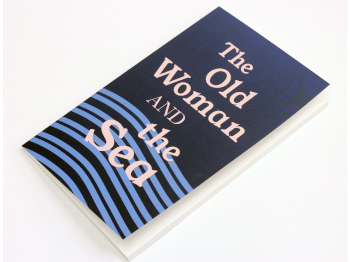She always thought of the sea as la mar which is what people call her in Spanish when they love her. Sometimes those who love her say bad things of her but they are always said as though she were a woman. Some of the younger fishermen, those who used buoys as floats for their lines and had motorboats, bought when the shark livers had brought much money, spoke of her as el mar which is masculine. They spoke of her as a contestant or a place or even an enemy. But the old woman always thought of her as feminine and as something that gave or withheld great favours, and if she did wild or wicked things it was because she could not help them. The moon affects her as it does a woman, she thought.
I was intrigued when I noticed this upcoming (virtual) event at my local library: Amanda White leads a reading group around the novel The Old Woman and the Sea, which she adapted from Ernest Hemingway’s The Old Man and the Sea to feature a female protagonist. Join us for discussion and debate: Will this slight but important shift change the story's human-nature narrative in interesting ways, generating new themes, metaphors, and meanings? Maybe because I’ve been less-than-enchanted by the non-literary nature of the book club I’m in, and maybe because The Old Man and the Sea is one of my favourite books, and likely a combination of both facts, I just had to sign up. I don’t know exactly what I was expecting by this rewriting, but Amanada White basically just changed the gender of the protagonist and her young helper (Santiago and Manolin are now Mariblanca and Ofelia), and in addition to swapping out “she/her” for “he/him” where necessary, the author also makes the fish and the sharks female instead of male. Nothing else is changed, and that certainly is intriguing.
She no longer dreamed of storms, nor of women, nor of great occurrences, nor of great fish, nor fights, nor contests of strength, nor of her wife. She only dreamed of places now and of the lions on the beach. They played like young cats in the dusk and she loved them as she loved the girl. She never dreamed about the girl. She simply woke, looked out the open door at the moon and unrolled her trousers and put them on. She urinated outside the shack and then went up the road to wake the girl. She was shivering with the morning cold. But she knew she would shiver herself warm and that soon she would be rowing.
I have to assume that this version of the narrative is taking place at the same time as Hemingway’s original (published in 1952, but seemingly timeless) and the first hurdle is to accept that Mariblanca can live unmolested and alone as an old woman, urinating freely outside her shack, and having had a wife. What is notable about Hemingway’s story is that Santiago’s fight against the fish is such an inherently manly, macho fight — Santiago is the bullfighter, the soldier, the fifth columnist from Hemingway’s other novels; men who throw themselves against the world in order to test their mettle — whereas Mariblanca just seems to be an old woman, needing a big fish to get her through the winter. I can buy that she is every bit as strong and knowledgeable as her male avatar, but just changing the gender does make me assume different motivations for her. I found myself drawn to those passages in which Mariblanca regards the fish with the more “feminine” qualities of empathy and compassion:
Then she began to pity the great fish that she had hooked. She is wonderful and strange and who knows how old she is, she thought. Never have I had such a strong fish nor one who acted so strangely. Perhaps she is too wise to jump. She could ruin me by jumping or by a wild rush. But perhaps she has been hooked many times before and she knows that this is how she should make her fight. She cannot know that it is only one woman against her, nor that it is an old woman. But what a great fish she is and what she will bring in the market if the flesh is good. She took the bait like a female and she pulls like a female and her fight has no panic in it. I wonder if she has any plans or if she is just as desperate as I am?
And yet, the essential spirit of Santiago does run in Mariblanca’s veins:
"I'll kill her though," she said. "In all her greatness and her glory."
Although it is unjust, she thought. But I will show her what a woman can do and what a woman endures.
"I told the girl I was a strange old woman," she said. "Now is when I must prove it."
Even the ending feels more satisfying and credible when voiced by a woman; by this woman:
The wind is our friend, anyway, she thought. Then she added, sometimes. And the great sea with our friends and our enemies. And bed, she thought. Bed is my friend. Just bed, she thought. Bed will be a great thing. It is easy when you are beaten, she thought. I never knew how easy it was. And what beat you, she thought.
"Nothing," she said aloud. "I went out too far.”
And now that I am prepared with some thoughts, I am very much looking forward to the discussion we’ll be having around this project.
